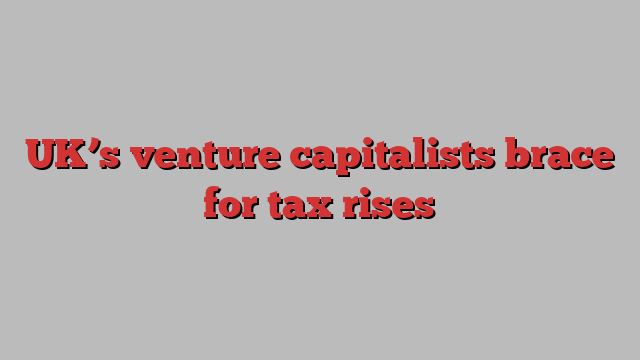
One scoop to start: UK regulators are set to dramatically scale back a new regime that would have forced banks and payment companies to reimburse fraud victims up to £415,000 after strong pressure from ministers and fintech groups.
Welcome to Due Diligence, your briefing on dealmaking, private equity and corporate finance. This article is an on-site version of the newsletter. Premium subscribers can sign up here to get the newsletter delivered every Tuesday to Friday. Standard subscribers can upgrade to Premium here, or explore all FT newsletters. Get in touch with us anytime: [email protected]
In today’s newsletter:
-
Venture investors brace for tax hikes
-
Cleantech roiled by failures
-
EU’s top court sides with Illumina
Higher UK taxes threaten venture capital
For the UK’s venture capital industry, the looming arrival of a new tax regime is being denounced in life and death terms.
Haakon Overli, co-founder of UK venture investor Dawn Capital, warned the contemplated tax increases “would hit us so hard . . . if suddenly 45 per cent of it goes away our economic model ceases to work”.
The alarm from Overli and his rivals across Britain comes as the Labour party and chancellor Rachel Reeves attempt to pin down their first Budget, due this autumn. The plan is expected to make “big asks” of the wealthy, many of whom are up in arms.
The venture capital industry’s concerns centre on two changes to the tax code: a potential increase in the capital gains tax and the closing of some of the loopholes that set how carried interest — the lucrative performance fees that fund managers receive from asset sales — is taxed.
Even before anything final has been approved, the discontent is palpable.
“If anything makes the UK less attractive for talent — and increasing taxes will do so — the country as a whole will end up losing,” said Taavet Hinrikus, the co-founder of London-listed fintech Wise who now runs European tech investor Plural.
The tax shift will be laid out in the October Budget. Many already see the writing on the wall: Prime Minister Keir Starmer last week gave his clearest indication yet that tax increases were on the horizon.
Reeves has said there was a £22bn “black hole” in the public finances left by the Conservative government that needed mending, with gaps in funding for Britain’s asylum system and railways.
Capital gains and carried interest are taxed in the UK at a rate of 20 per cent and 28 per cent, respectively. That’s much lower than the highest bracket of income tax, which is 45 per cent.
While private equity executives are the first group that clearly would be affected by the rises, venture capitalists would also be forced to pay up.
The industry is arguing that it shouldn’t be treated like its private equity peers, given so many of its wagers don’t turn profitable — let alone into unicorns. It believes taxing the profits on its big wins, as a result, would hamper the industry and future investment in start-ups.
Cleantech company failures pile up
Not too long ago, green tech was all the rage. Low interest rates made it feasible for start-ups in the budding industry to raise staggering amounts of money even if profits remained elusive.
But those businesses are now going through a rough patch. Cleantech companies that had only recently raised hundreds of millions of dollars from big investors such as SoftBank and Amazon are starting to fail.
New investments are now difficult to come by, with high interest rates and delays in federal funding putting the sector in a precarious state.
There have been a handful of failures recently: battery start-up Moxion Power and publicly traded US solar company SunPower both filed for bankruptcy in August. And on Tuesday, solar panel provider Lumio filed for Chapter 11.
Moxion and SunPower are among four big renewable energy companies that have filed for bankruptcy this year — the most since 2014 — according to Bloomberg data that includes companies with more than $50mn in liabilities.
And there are other failed companies that have avoided the court process. Swell Energy, a solar energy and battery provider that raised $120mn in 2022 from SoftBank’s Vision Fund and Ares Management, said it was winding down operations.
It’s a big leap for a company to go from the start-up phase to commercial viability at scale, something that’s often referred to as the “missing middle”.
Arash Nazhad, co-head of the cleantech group at Moelis, said the climate tech and energy transition sectors “are particularly affected because of the capital intensity required for impactful solutions”.
Adding to the sector’s troubles is the fact that start-up investors are also being pulled in other directions, including artificial intelligence, life sciences and defence tech, said Bilal Zuberi, a general partner at Lux Capital.
EU’s top court sides with Illumina
Regulators in Brussels caused serious consternation among dealmakers recently when they attempted to stretch their powers by blocking Illumina’s $8bn acquisition of cancer screening start-up Grail.
Even though the target had no revenues or presence in Europe, antitrust regulators probed the transaction, and then ultimately forced Illumina to spin off Grail in June.
But on Tuesday dealmakers got some relief: Europe’s top court, the European Court of Justice, said the regulators had no right to investigate the tie-up.
As a result, Illumina said a €432mn fine levied against the company for closing the merger without the EU’s approval would no longer be payable.
The court said: “The [European] Commission is not authorised to encourage or accept referrals of proposed concentrations without a European dimension from national competition authorities where those authorities are not competent to examine those proposed concentrations under their own national law.”
But despite the blow, Margrethe Vestager, the outgoing EU competition chief, insisted Brussels now had “more extensive” powers to review deals.
Others had a less rosy interpretation. “This was a slap in the face,” said one adviser who worked on the deal.
Brussels wasn’t the only country looking into the deal. The tie-up also faced opposition from the US Federal Trade Commission.
But at least in Brussels, regulators will now have to make sure future deals fall under their purview.
Kasia Czapracka, a partner at White & Case, said: “The commission’s increasingly aggressive merger control policies must have a firm legal basis. They did not in this case and in a number of other cases in which the commission has intervened since.”
Job moves
-
Citigroup has hired Achintya Mangla as head of financing for investment banking, a new role that will include equity and global debt capital markets. He previously spent more than two decades at JPMorgan.
-
Gibson Dunn has hired Will Summers as a partner with the firm’s private equity team in London. He previously worked for White & Case.
-
Jasper Street Partners has hired Duncan Herrington and Peter da Silva Vint to lead the firm’s shareholder activist defence business. They previously worked at Moelis and Barclays, respectively.
-
Latham & Watkins has brought on Melanie Howard as a partner in the corporate department, where she will focus on healthcare, life sciences and M&A. She previously worked for Baker McKenzie.
-
Weil Gotshal has hired Luke Laumann as a partner with the private equity group in New York. He previously worked for White & Case.
Smart reads
Return to office Londoners have been slower to return to their desks than workers in New York or Paris, showing that the pandemic’s effects on how we work still linger, the FT reports.
Cut-throat covenants Creditors are being pitted against each other — and roiling the bond market — in what’s being dubbed the “covenant wars”, Bloomberg writes.
Property troubles With the real estate market in such a dire state, investors are having a hard time getting out of deals. That’s where secondary funds come in, the New York Times reports.
News round-up
Chelsea FC co-owner Clearlake buys private credit business from Natixis (FT)
LVMH-backed L Catterton and Airstream maker invest in RV park operator (FT)
BC Partners buys a stake in sports agency GSE Worldwide (FT)
EY draws up female-dominated shortlist for top UK job (FT)
France’s Total pursues Adani ties with new solar investment (FT)
Nvidia gets DoJ subpoena in escalating antitrust probe (Bloomberg)
Insurers face $151bn in yearly losses from natural disasters, report forecasts (FT)
VW considers closing factors in Germany and cutting jobs (FT)

Due Diligence is written by Arash Massoudi, Ivan Levingston, Ortenca Aliaj, and Robert Smith in London, James Fontanella-Khan, Sujeet Indap, Eric Platt, Antoine Gara, Amelia Pollard and Maria Heeter in New York, Kaye Wiggins in Hong Kong, George Hammond and Tabby Kinder in San Francisco, and Javier Espinoza in Brussels. Please send feedback to [email protected]
Recommended newsletters for you
Full Disclosure — Keeping you up to date with the biggest international legal news, from the courts to law enforcement and the business of law. Sign up here
Scoreboard — Key news and analysis behind the business decisions in sport. Sign up here